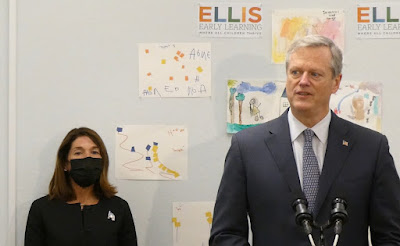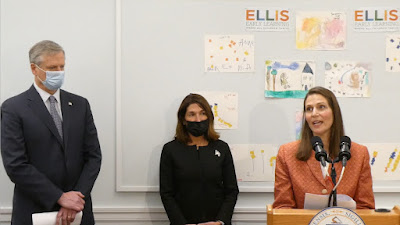Testing for Child Care Providers to Keep Children in Care
Child Care Providers will have three testing
options for staff and children in care
BOSTON
— The Baker-Polito Administration announced today
that child care programs will be able to receive rapid antigen COVID-19 tests
by the week of January 31 as part of new testing programs to keep children in
child care and early education programs open in the Commonwealth.Governor Charlie Baker announcing testing program for childcare agencies.
(Photo by Chutze Chou)
Testing for Child Care is a first-in-the-nation statewide testing
initiative that will allow staff and children 2 years and older, who are close
contacts of a COVID positive individual, to test daily for five consecutive
days with rapid antigen tests and remain in the child care setting as
long as the test is negative. Additionally, staff and children 2 years and
older who develop symptoms while attending or providing care will be eligible
to participate in a symptomatic program. Testing for Child Care will
provide all child care programs affiliated with the Department of Early
Education and Care (EEC) access to sign up for free COVID-19 tests, resources,
and training to implement these new protocols.
“This comprehensive testing program is designed to ensure children can
safely continue learning and receiving quality care while parents are
working,” said Governor Charlie Baker. “Child care is a key
piece of the infrastructure supporting the Commonwealth’s economy, and this
testing program will help to eliminate one of the challenges parents and
employers face every day.”CEO of Ellis early learning Lauren B. Cook (at right).
“Child care programs have continued to operate despite challenging
circumstances throughout the COVID-19 pandemic, and working parents of young
children have oftentimes been struggling to get back to work consistently,” said
Lt. Governor Karyn Polito. “Our goal is to provide child care programs
with the resources they need to operate on a continuous basis and for our
families to have access to tests and the information they need to remain in
care.”
EEC’s new Testing for Child Care provides three options for
COVID-19 testing to meet programs’ specific needs. Providers can opt into any
or all three:
- Rapid Cohort Testing:
Testing staff and children over 2 years old in a group (cohort) where
there was direct exposure to an individual who is positive for COVID-19.
This option tests cohorts of direct contacts (e.g., single classroom or
stable family child care attendance), rather than requiring individuals to
quarantine.
- Symptomatic Rapid Antigen Testing: Testing for staff and children over 2 years old
who show symptoms related to COVID-19. This allows child care centers to
quickly identify and isolate positive cases or confirm negative cases and
keep children in care.
- Weekly Pooled Testing:
Weekly PCR testing for all consenting staff and children over 3 years old.
To implement these testing options, EEC is working with Neighborhood Villages, a non-profit organization that began partnering with the Department last year to provide weekly pooled testing for child care EEC will deliver free rapid tests directly to child care programs that sign up with Neighborhood Villages. In addition to enrolling programs, Neighborhood Villages will coordinate the distribution of rapid tests and training for test usage with child care providers. Signing up with Neighborhood Villages is free for programs.
Distribution of free rapid antigen tests to programs enrolled with Neighborhood Villages is expected to begin the week of January 31, 2022. EEC-licensed and approved programs can enroll on a rolling basis; however, programs must enroll with Neighborhood Villages prior to January 24, 2022 to begin testing the week of January 31st.
The Baker-Polito Administration announced last week it ordered 26 million at-home rapid antigen tests from iHealth that will be delivered over the next three months, and K-12 schools and child care centers will be prioritized for those tests. More than 7,700 EEC affiliated child care providers are eligible to participate in Testing for Child Care.
“It is critical that we provide child care programs with the necessary tests and supports to remain operational throughout this time,” said Education Secretary James Peyser. “We know even our earliest learners get enormous benefits from being in person with their peers and teachers. This testing strategy, layered on top of the other mitigation strategies that EEC has already put in place, will help to continue to make that possible for young children across the Commonwealth.”
“This program is part of EEC’s multi-faceted plan for addressing the impact the COVID-19 pandemic has had on child care providers and the parents that depend on safe, reliable care for their children so they can return to work,” said EEC Commissioner Samantha Aigner-Treworgy. “Expanding our testing options for the early education sector is one way we can keep experienced educators safe, healthy, and providing quality care for families.”
“We are excited about these enhancements to the testing program. They will offer child care providers across the state multi-pronged testing strategies and additional support,” said Neighborhood Villages Co-Founder and Chief Innovation Officer Sarah Siegel Muncey. “Testing in early childhood is one of the fastest, most effective investments we can make right now to keep child care centers open and our educators, children, and families safe - while also allowing our parents to continue to work. I want to thank Governor Baker and his Administration for their ongoing partnership and commitment to this important issue.”
As part of the testing program, child care providers must adhere to EEC’s COVID-19 Mitigation Protocols & Guidelines. These protocols align with the best practices, guidance, and recommendations of the Centers for Disease Control and Prevention, Massachusetts Department of Public Health, and the Department of Elementary and Secondary Education. EEC-licensed child care providers that choose to implement their own testing regimens without utilizing the Testing for Child Care program are expected to abide by EEC’s testing protocols.
School-age children served in EEC-affiliated Out-of-School-Time (OST) programs may already participate in one of DESE’s testing programs during the school day. For those school-age children who already participate in a DESE-approved testing program, no additional testing is recommended at the EEC -licensed program.
Additional COVID-19 Resources Available to Child Care Providers:
No-Cost, Drive-through COVID-19 Testing
EEC continues offering no-cost COVID-19 drive-through testing for the child care community at eight locations across Massachusetts. Information on EEC’s mobile testing sites can be accessed here.
Statewide Contract Support for Anitgen Test Kit Purchasing
Programs that want to purchase their own antigen tests now have access to the Statewide Contract set up by the Baker-Polito Administration to provide antigen tests at state-negotiated rates for eligible entitles.
Supplemental Personal Protection Equipment (PPE) for Child Care
Open and operating EEC-licensed providers continue to be able to order supplemental PPE supplies and have them delivered directly to the program at no cost to them.
Mobile Vaccination Clinics
The Baker-Polito Administration offers mobile pop-up vaccination clinics that take place in a community-based setting, including schools and child care centers. The clinics are organized to bring vaccines to a community setting and are available to employers, schools and school districts, community organizations, and other groups.


沒有留言:
發佈留言